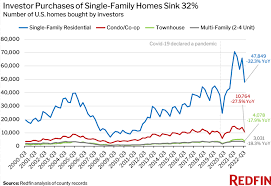Investors Buying Homes: A Growing Trend in the Real Estate Market
In recent years, the real estate market has seen a significant rise in the number of investors buying homes as part of their investment strategy. These investors, ranging from individuals to large corporations, are capitalizing on the potential for long-term returns and diversification that real estate offers.
One of the main reasons behind this trend is the stability and tangibility that real estate investments provide. Unlike stocks or other financial instruments, owning a physical asset like a home can offer a sense of security and control over one’s investment portfolio. Additionally, rental properties can generate passive income through monthly rent payments, making real estate an attractive option for investors seeking steady cash flow.
Another factor driving investors to buy homes is the potential for appreciation in property values over time. While real estate markets can fluctuate, historically, property values have tended to increase over the long term. This appreciation can result in substantial profits when investors decide to sell their properties down the line.
Furthermore, with advancements in technology and online platforms, it has become easier than ever for investors to research and identify lucrative real estate opportunities. From analyzing market trends to conducting virtual property tours, technology has streamlined the process of buying homes for investment purposes.
It’s essential for investors looking to buy homes to conduct thorough due diligence and seek professional advice to make informed decisions. Factors such as location, market conditions, rental demand, and potential renovation costs should all be carefully considered before making a purchase.
In conclusion, investors buying homes have become an integral part of the real estate landscape. Whether seeking rental income, capital appreciation, or portfolio diversification, investing in residential properties can offer numerous benefits for those willing to navigate the market strategically.
Understanding Investor Home Purchases: Payment, Finding Investors, Purchase Process, and Motivations
- How much will an investor pay for a house?
- How do I find an investor to buy a house?
- What happens when an investor buys a house?
- Why would an investor buy a house?
How much will an investor pay for a house?
When it comes to the question of how much an investor will pay for a house, there is no one-size-fits-all answer. The price an investor is willing to pay for a house can vary significantly based on various factors such as the property’s location, condition, market trends, and the investor’s specific investment goals. Some investors may be willing to pay above market value for a property with high potential for rental income or appreciation, while others may seek discounted properties that require renovation or repairs. Ultimately, the price an investor is willing to pay for a house will depend on a careful analysis of these factors and their individual investment strategy.
How do I find an investor to buy a house?
When looking to find an investor to buy a house, there are several avenues you can explore. One common approach is to connect with local real estate investment groups or networking events where investors often gather to discuss potential opportunities. Additionally, reaching out to real estate agents who specialize in working with investors can help you tap into their network of buyers. Utilizing online platforms and social media channels dedicated to real estate investment can also be a fruitful way to connect with potential investors looking to purchase properties. By leveraging these resources and actively seeking out opportunities, you can increase your chances of finding the right investor to buy your house.
What happens when an investor buys a house?
When an investor buys a house, several possibilities unfold depending on their investment strategy. The investor may choose to renovate the property to increase its value and appeal to potential buyers or renters. Alternatively, they might opt to hold onto the property and generate rental income, creating a source of passive cash flow. Some investors may also look to flip the house quickly for a profit by selling it at a higher price than what they paid for it. Ultimately, the outcome of an investor buying a house is influenced by their goals, market conditions, and the specific characteristics of the property in question.
Why would an investor buy a house?
Investors buy houses for a variety of reasons, primarily to generate income and build wealth. Owning a rental property allows investors to earn passive income through rental payments, providing a steady cash flow over time. Additionally, real estate has the potential for long-term appreciation, meaning that the value of the property may increase over time, offering investors the opportunity to realize capital gains when they decide to sell. Furthermore, investing in real estate can serve as a hedge against inflation and provide diversification within an investment portfolio. Overall, buying a house can be a strategic financial decision for investors looking to grow their wealth and secure their financial future.
Tags: buying homes, control, diversification, due diligence, investment strategy, investors, investors buying homes, location, long-term returns, lucrative opportunities, market conditions, online platforms, passive income, physical asset, professional advice, property values appreciation, real estate market, renovation costs, rental demand, research, security, stability, tangibility, technology
